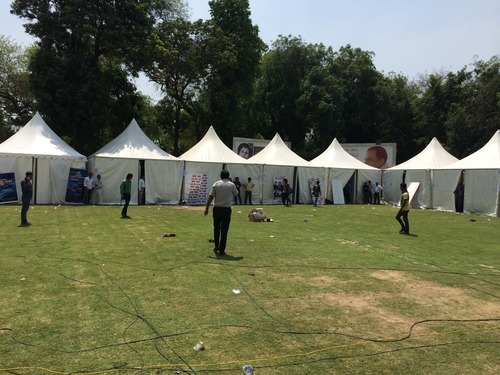Just over a month ago, I stood in the streets of Delhi as the results of India’s general election were announced. The difference between the headquarters of the two major parties was stark: the Congress party HQ, which suffered their worst defeat in India’s history, was abandoned while the Bharatiya Janata Party (BJP) HQ, which won a landslide victory, was nearly inaccessible due to the crowd.

Congress Party headquarters with billboards of former Prime Ministers Indira Gandhi and Rajiv Gandhi in the background
I had witnessed the largest election in human history (writing about it for Quartz). 815 million people were eligible to vote, of which 66.4% - 540 million - turned up at the 900,000+ polling stations spread across India geographically and temporally over 5 weeks. When you really think about it, the feat of this election was herculean. Voters had to be registered, information spread, and the electorate mobilized.

BJP headquarters barricaded from direct entrance via the street.
Yet, we vote everyday. We make decisions on how to feed ourselves and our children, how to allocate our leisure time, and when and where to make purchases. Some of us have to decide when to plant crops, how to treat illness without access to proper medical facilities, and how to teach our children when schooling is scarce. In more dire cases, we choose when to resist oppression or when to flee when conflict arises and, if so, where. A successful vote, from the political to the mundane, hinges on three things: access, information, and participation. These conditions vary across India for a political election just as they do across the world for the silent ballots we cast constantly. But what if these three factors were raised to a common global denominator? The question then becomes: what will humanity vote for?
At present, roughly 60% of the human race cannot touch the Internet and the information it grants access to. If, tomorrow, all that information were suddenly available to everyone, how would that alter our trajectory as a species? Suddenly, our entire intellectual capacity would be unlocked - not just 40% of it. Literacy could be solved via audio files, open courseware for higher learning could be viewed anywhere, “censorship” becomes more like smallpox - a disease once prevalent but now eradicated - and the horizon spreads endlessly.
One day, we will look at this step as so logical it will be overlooked. Information access for everyone will be viewed by future generations as so fundamentally critical that cliches will be coined about the time when the world was any other way. This has happened before.
Three hundred years ago, the notion of knowing one’s longitude at sea was an impractical idea. While latitude can be fixed via the stars, knowing longitude requires the keeping of time so that one’s local noon, as determined by the sun appearing directly overhead, can be compared to the noon of a fixed point (like Greenwich) that is maintained on a reliable ship's clock. The distance can then be calculated knowing the sun moves roughly 15 degrees every hour. But clocks at sea were precarious due to constant motion, salt corrosion, and fluctuating temperature affecting the metals. Just a few seconds of error can translate into several nautical miles of inaccuracy and, in turn, enormous risk in navigation. Isaac Newton and Christiaan Huygens, two of the greatest minds of the time, doubted such a clock could ever be built. After a navigation error resulted in one of the largest naval disasters in British history, the British Parliament created a prize of £20,000 for anyone who could find a way to reliably determine longitude. Like we view the notion of curing cancer today, people wondered if longitude could ever be solved. Then, in 1736, a carpenter from a tiny village in rural England named John Harrison tested the first iteration of his marine chronometer on a voyage to Lisbon. He would go on to claim the prize and subsequently relegate the problem of longitude to the cobwebbed shelves of forgotten obstacles.
We are innately curious. We sail even if we cannot know precisely where we are or where we are going. With Outernet, that phase of human history will come to a welcome close.
From one historic human election to another, I am thrilled to be a part of the Outernet mission. Please stay in touch.
Avidly,
Thane Richard, Director of User Engagement
@ThaneRichard

Congress Party headquarters with billboards of former Prime Ministers Indira Gandhi and Rajiv Gandhi in the background
I had witnessed the largest election in human history (writing about it for Quartz). 815 million people were eligible to vote, of which 66.4% - 540 million - turned up at the 900,000+ polling stations spread across India geographically and temporally over 5 weeks. When you really think about it, the feat of this election was herculean. Voters had to be registered, information spread, and the electorate mobilized.

BJP headquarters barricaded from direct entrance via the street.
Yet, we vote everyday. We make decisions on how to feed ourselves and our children, how to allocate our leisure time, and when and where to make purchases. Some of us have to decide when to plant crops, how to treat illness without access to proper medical facilities, and how to teach our children when schooling is scarce. In more dire cases, we choose when to resist oppression or when to flee when conflict arises and, if so, where. A successful vote, from the political to the mundane, hinges on three things: access, information, and participation. These conditions vary across India for a political election just as they do across the world for the silent ballots we cast constantly. But what if these three factors were raised to a common global denominator? The question then becomes: what will humanity vote for?
At present, roughly 60% of the human race cannot touch the Internet and the information it grants access to. If, tomorrow, all that information were suddenly available to everyone, how would that alter our trajectory as a species? Suddenly, our entire intellectual capacity would be unlocked - not just 40% of it. Literacy could be solved via audio files, open courseware for higher learning could be viewed anywhere, “censorship” becomes more like smallpox - a disease once prevalent but now eradicated - and the horizon spreads endlessly.
One day, we will look at this step as so logical it will be overlooked. Information access for everyone will be viewed by future generations as so fundamentally critical that cliches will be coined about the time when the world was any other way. This has happened before.
Three hundred years ago, the notion of knowing one’s longitude at sea was an impractical idea. While latitude can be fixed via the stars, knowing longitude requires the keeping of time so that one’s local noon, as determined by the sun appearing directly overhead, can be compared to the noon of a fixed point (like Greenwich) that is maintained on a reliable ship's clock. The distance can then be calculated knowing the sun moves roughly 15 degrees every hour. But clocks at sea were precarious due to constant motion, salt corrosion, and fluctuating temperature affecting the metals. Just a few seconds of error can translate into several nautical miles of inaccuracy and, in turn, enormous risk in navigation. Isaac Newton and Christiaan Huygens, two of the greatest minds of the time, doubted such a clock could ever be built. After a navigation error resulted in one of the largest naval disasters in British history, the British Parliament created a prize of £20,000 for anyone who could find a way to reliably determine longitude. Like we view the notion of curing cancer today, people wondered if longitude could ever be solved. Then, in 1736, a carpenter from a tiny village in rural England named John Harrison tested the first iteration of his marine chronometer on a voyage to Lisbon. He would go on to claim the prize and subsequently relegate the problem of longitude to the cobwebbed shelves of forgotten obstacles.
We are innately curious. We sail even if we cannot know precisely where we are or where we are going. With Outernet, that phase of human history will come to a welcome close.
From one historic human election to another, I am thrilled to be a part of the Outernet mission. Please stay in touch.
Avidly,
Thane Richard, Director of User Engagement
@ThaneRichard


